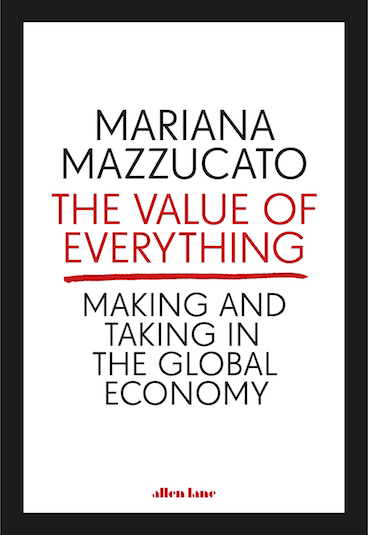I will start with my favorite among the recent readings: Mariana Mazzucato’s The Value of Everything Making and Taking in the Global Economy (Allen Lane, 2018). The title is an allusion to Oscar Wilde’s famous maxim that “a cynic is the one who knows the price of everything and value of nothing”. Have we not turned into economic cynics by throwing away the concept of value and replacing it with price?
I find the book important and interesting for two reasons. Firstly, the subject itself. Mariana poses questions critical not only from the technical, economic point of view but also from social and ethical perspective: How value is created, how this is measured, and how and by whom this value is extracted. Secondly, a combination of a substantive theoretical discussion about the concept of value in economics with a discussion of how the modern value narrative is reflected in economic facts. Those of us who studies economics more recently may not even have come across the concept of value as it was conveniently replaced with the concept of price through a “marginalist revolution”: Whatever has a price is valuable. If it doesn’t, then it is not valuable at all. (As someone coming from a former Socialist country, I was privileged to be educated in the spirit of the classical value theory of labor and the marginalist sterility hit me somewhat later in life.)
The consequences of this transition are extremely poignant: Economics (particularly in its previous incarnation as political economy) used to be a science dealing with cardinal social issues, such as social conflict, class divisions and social stratification, wealth creation and measurement. With value gone from the equation, these discussions became meaningless and impossible. These raises a number of theoretical issues explored by Mariana in the first part of the book:
- The role and scope of modern economics, something that has been very hotly debated recently. To what extent economics should deal with “big” social issues (if at all) as opposed to specific issues that lend themselves to econometrics and may be empirically verified (e.g., unemployment effects of minimum wages, etc.)?
- The methodological foundation of modern economics. In his Economics Rule Dani Rodrik argues that in fact it is supply and demand equilibrium that rules. (Probably, no one has done more to “universalize” this methodology than Gary Becker who expanded it to law and politics, marriage and fertility and social interaction (The Economic Approach to Human Behavior). The inadequacy of this foundation (incidentally, neither supply nor demand can be empirically observed, these are purely imaginary constructs) has been highlighted many times (for a more recent discussion see David Orrell, Economyths: 11 Ways Economics Gets It Wrong).
- This entails methodological issues around value definition and value measurement. As we think about the wealth of nations, what is left at the conceptual level, GDP? But its inadequacies are also well-known. Mariana, following some other authors, argues that aspects of the economy, from R&D and housework to the environment and the black economy, proved difficult to assess using marginal utility. One delicious example is an increase in the British contribution to NATO some five years ago, which was due to incorporating the value of illegal drug trade and prostitution in the GDP resulting in an increase of the UK budget contribution to NATO as a percentage of GDP, https://www.theguardian.com/business/2014/jun/10/accounting-drugs-prostitution-uk-economy-gdp-eu-rules.
- What is the role of the financial sector and its impact on real economy? If Goldman Sachs receives a multimillion profit from placement of Collateralized Debt Obligations, then, as its CEO claimed, they are the main value creator (forget about the multibillion rescue package from the taxpayers’ pockets). Government, on the contrary, creates no value – it only spends extracting the value earned by someone else through tax and nontax collection. Then indeed the financial sector (which accounted for 7% of the total economic output in the UK in 2018) may be the greatest value creator and not the real economy. But is what the financial sector does value creation or value extraction? Marian together with other well-respected researchers argues that the latter is the case (see, for example, Other People’s Money by Jon Kay who argues that the financial sector in its present form is based on value extraction as a result of transfers within the sector itself). Marian distinguishes three ways in which finance extracts value: by inserting a wedge, in the form of transaction costs, between providers and receivers of finance; through monopoly power, especially in the case of banks; and with high charges relative to risks run, notably in fund management. However, she believes that in the end, “the real challenge is not to label finance as value-creating or value-extracting but to fundamentally transform it so that it is genuinely value-creating.”
